Paper Menu >>
Journal Menu >>
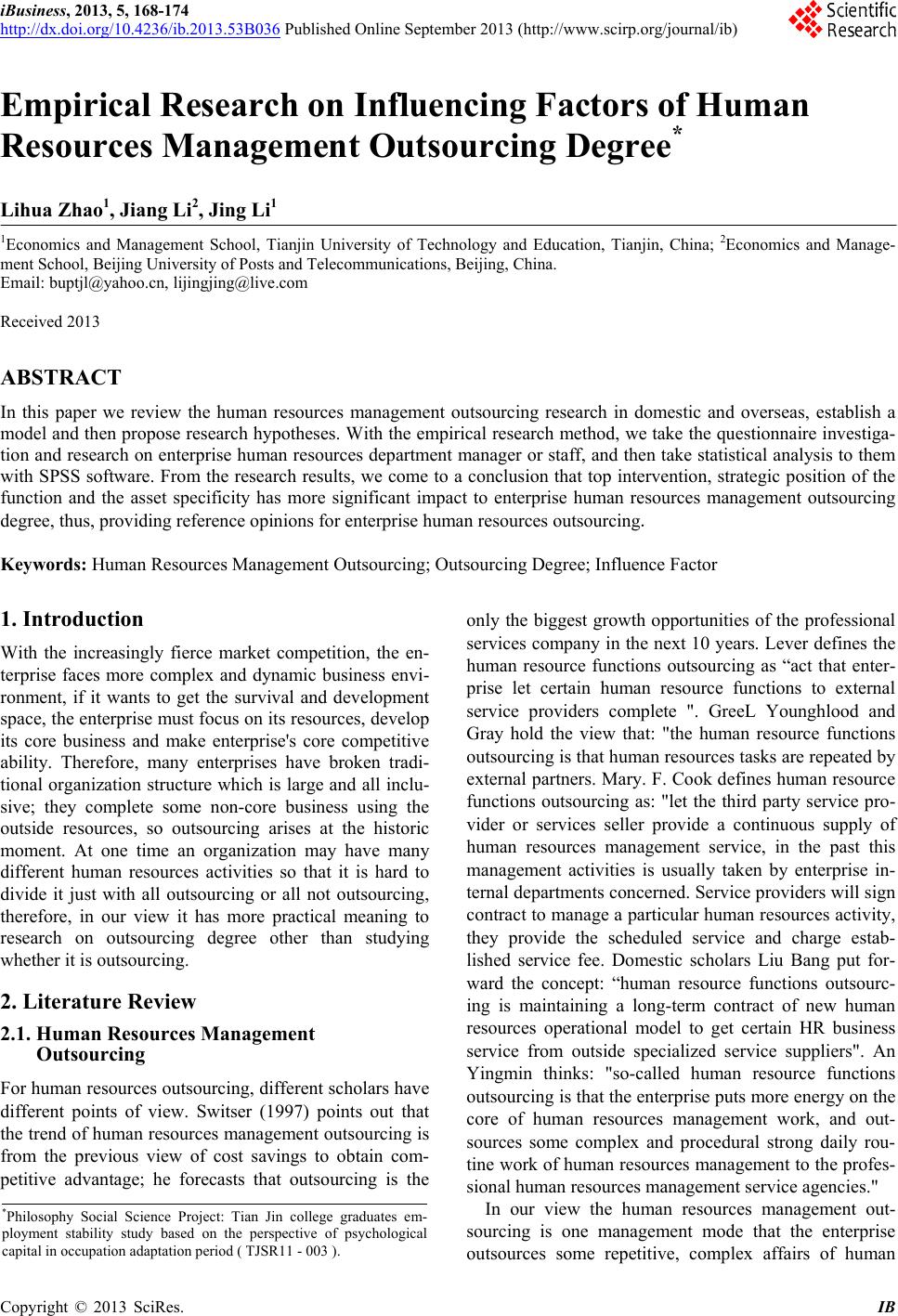 iBusiness, 2013, 5, 168-174 http://dx.doi.org/10.4236/ib.2013.53B036 Published Online September 2013 (http://www.scirp.org/journal/ib) Empirical Research on Influencing Factors of Human Resources Management Outsourcing Degree* Lihua Zhao1, Jiang Li2, J ing Li1 1Economics and Management School, Tianjin University of Technology and Education, Tianjin, China; 2Economics and Manage- ment School, Beijing University of Posts and Telecommunications, Beijing, China. Email: buptjl@yahoo.cn, lijingjing@live.com Received 2013 ABSTRACT In this paper we review the human resources management outsourcing research in domestic and overseas, establish a model and then propose research hypotheses. With the empirical research method, we take the questionnaire investiga- tion and research on enterpr ise human resources department manage r or staff, and then take statistical analysis to them with SPSS software. From the research results, we come to a conclusion that top intervention, strategic position of the function and the asset specificity has more significant impact to enterprise human resources management outsourcing degree, thus, provid ing reference opinions for enterprise human resources outsourcing. Keywords: Human Resources Management Outsourcing; Outsourcing Degree; Influence Factor 1. Introduction With the increasingly fierce market competition, the en- terprise faces more complex and dynamic business envi- ronment, if it wants to get the survival and development space, the enterprise must focus on its resources, develop its core business and make enterprise's core competitive ability. Therefore, many enterprises have broken tradi- tional organization structure which is large and all inclu- sive; they complete some non-core business using the outside resources, so outsourcing arises at the historic moment. At one time an organization may have many different human resources activities so that it is hard to divide it just with all outsourcing or all not outsourcing, therefore, in our view it has more practical meaning to research on outsourcing degree other than studying whether it is outsourcing. 2. Literature Review 2.1. Human Resources Management Outsourcing For human resources outsourcing, different scholars have different points of view. Switser (1997) points out that the trend of human resources management outsourcing is from the previous view of cost savings to obtain com- petitive advantage; he forecasts that outsourcing is the only the biggest growth opportunities of the professional services company in the next 10 years. Lever defines the human resource functions outsourcing as “act that enter- prise let certain human resource functions to external service providers complete ". GreeL Younghlood and Gray hold the view that: "the human resource functions outsourcing is that human resources tasks are repeated by external partners. Mary. F. Cook defines human resource functions outsourcing as: "let the third party service pro- vider or services seller provide a continuous supply of human resources management service, in the past this management activities is usually taken by enterprise in- ternal departments concerned. Service provid ers will sign contract to manage a particular human resources activity, they provide the scheduled service and charge estab- lished service fee. Domestic scholars Liu Bang put for- ward the concept: “human resource functions outsourc- ing is maintaining a long-term contract of new human resources operational model to get certain HR business service from outside specialized service suppliers". An Yingmin thinks: "so-called human resource functions outsourcing is that the enterprise puts more energy on the core of human resources management work, and out- sources some complex and procedural strong daily rou- tine work of human resources management to the profes- sional human resources management service agencies." In our view the human resources management out- sourcing is one management mode that the enterprise outsources some repetitive, complex affairs of human *Philosophy Social Science Project: Tian Jin college graduates em- p loyment stability study based on the perspective of psychological capital in occupation adaptation period ( TJSR11 - 003 ). Copyright © 2013 SciRes. IB 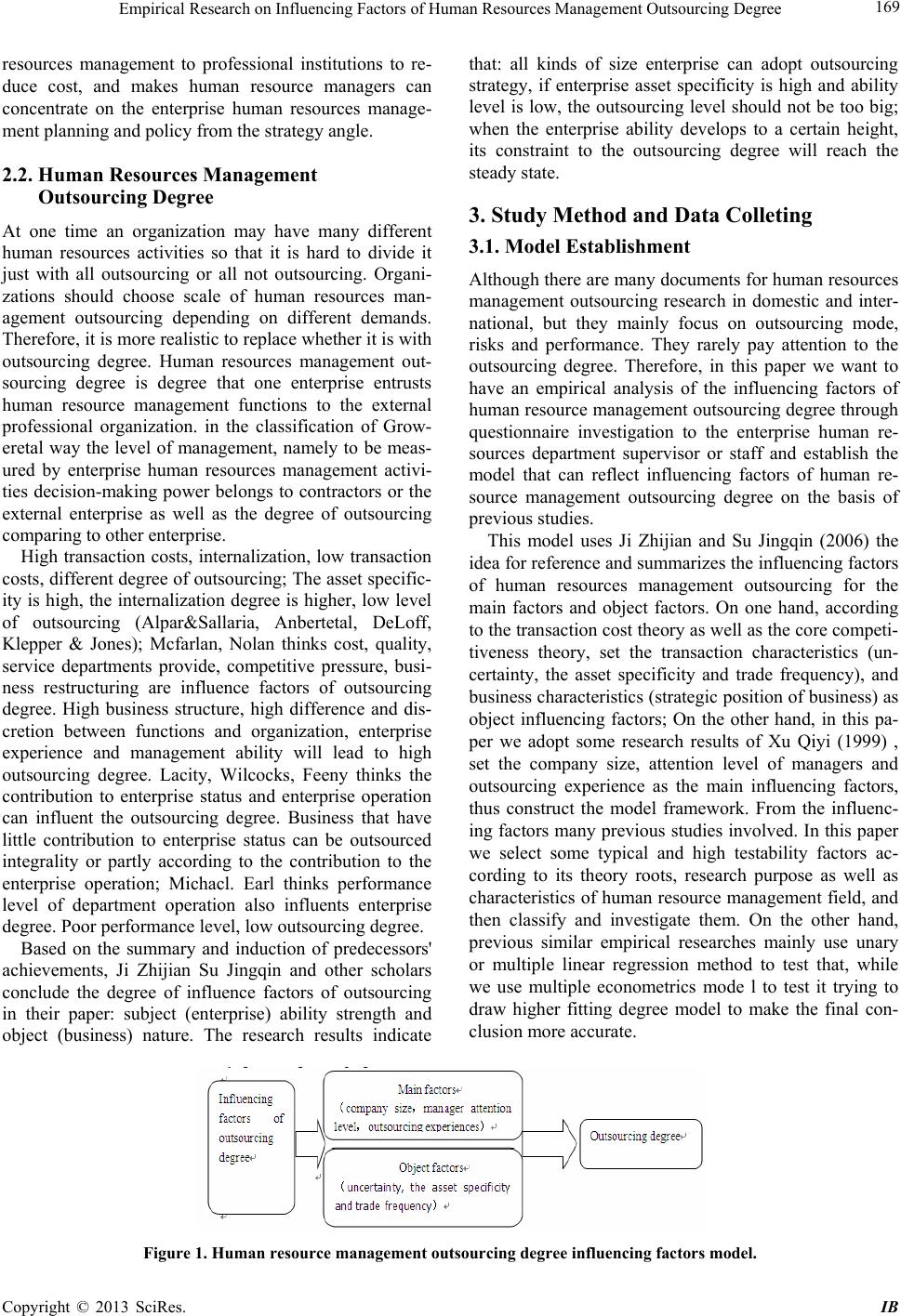 Empirical Research on Influencing Factors of Human Resources Management Outsourcing Degree 169 resources management to professional institutions to re- duce cost, and makes human resource managers can concentrate on the enterprise human resources manage- ment planning and policy from the strategy angle. 2.2. Human Resources Management Outsourcing Degree At one time an organization may have many different human resources activities so that it is hard to divide it just with all outsourcing or all not outsourcing. Organi- zations should choose scale of human resources man- agement outsourcing depending on different demands. Therefore, it is more realistic to replace whether it is with outsourcing degree. Human resources management out- sourcing degree is degree that one enterprise entrusts human resource management functions to the external professional organization. in the classification of Grow- eretal way the level of management, namely to be meas- ured by enterprise human resources management activi- ties decision-making power belongs to contractors or the external enterprise as well as the degree of outsourcing comparing to other enterprise. High transaction costs, internalization, low transaction costs, different degree of outsourcing; The asset specific- ity is high, the internalization degree is higher, low level of outsourcing (Alpar&Sallaria, Anbertetal, DeLoff, Klepper & Jones); Mcfarlan, Nolan thinks cost, quality, service departments provide, competitive pressure, busi- ness restructuring are influence factors of outsourcing degree. High business structure, high difference and dis- cretion between functions and organization, enterprise experience and management ability will lead to high outsourcing degree. Lacity, Wilcocks, Feeny thinks the contribution to enterprise status and enterprise operation can influent the outsourcing degree. Business that have little contribution to enterprise status can be outsourced integrality or partly according to the contribution to the enterprise operation; Michacl. Earl thinks performance level of department operation also influents enterprise degree. Poor performance level, low outsourcing degree. Based on the summary and induction of predecessors' achievements, Ji Zhijian Su Jingqin and other scholars conclude the degree of influence factors of outsourcing in their paper: subject (enterprise) ability strength and object (business) nature. The research results indicate that: all kinds of size enterprise can adopt outsourcing strategy, if enterprise asset specificity is high and ability level is low, the outsourcing level should not be too big; when the enterprise ability develops to a certain height, its constraint to the outsourcing degree will reach the steady state. 3. Study Method and Data Colleting 3.1. Model Establishment Although there are many documents for human resources management outsourcing research in domestic and inter- national, but they mainly focus on outsourcing mode, risks and performance. They rarely pay attention to the outsourcing degree. Therefore, in this paper we want to have an empirical analysis of the influencing factors of human resource management outsourcing degree through questionnaire investigation to the enterprise human re- sources department supervisor or staff and establish the model that can reflect influencing factors of human re- source management outsourcing degree on the basis of previous studie s. This model uses Ji Zhijian and Su Jingqin (2006) the idea for reference and summarizes the influencing factors of human resources management outsourcing for the main factors and object factors. On one hand, according to the tran sac tion co st th eory as well as the cor e comp eti- tiveness theory, set the transaction characteristics (un- certainty, the asset specificity and trade frequency), and business characteristics (strategic positio n of business) as object influencing factors; On the other hand, in this pa- per we adopt some research results of Xu Qiyi (1999) , set the company size, attention level of managers and outsourcing experience as the main influencing factors, thus construct the model framework. From the influenc- ing factors many previous studies involved. In this paper we select some typical and high testability factors ac- cording to its theory roots, research purpose as well as characteristics of human resource management field, and then classify and investigate them. On the other hand, previous similar empirical researches mainly use unary or multiple linear regression method to test that, while we use multiple econometrics mode l to test it trying to draw higher fitting degree model to make the final con- clusion more accurate. Figure 1. Human resource management outsourcing degree influe nc ing fac t or s mode l. Copyright © 2013 SciRes. IB 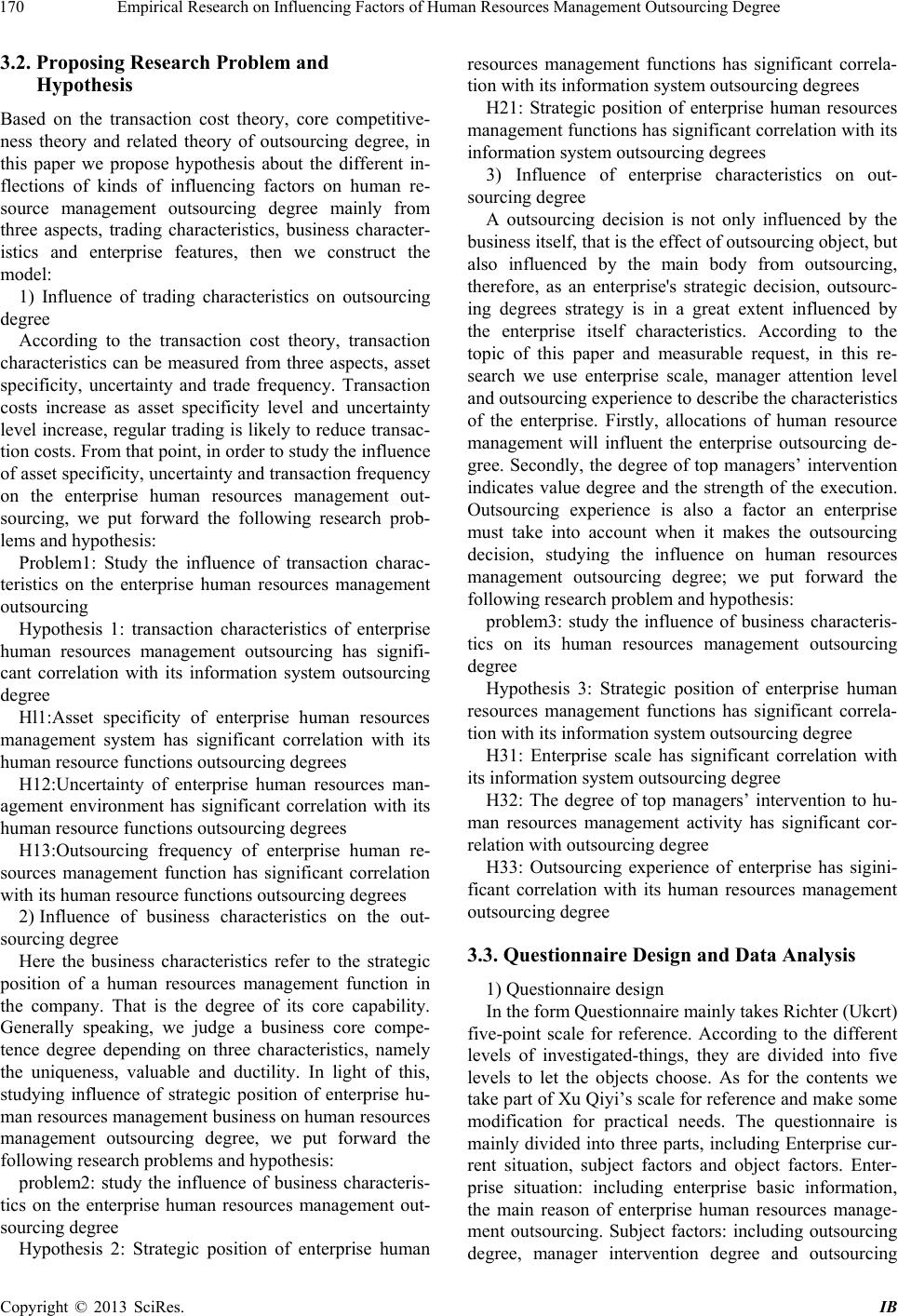 Empirical Research on Influencing Factors of Human Resources Management Outsourcing Degree 170 3.2. Proposing Research Problem and Hypothesis Based on the transaction cost theory, core competitive- ness theory and related theory of outsourcing degree, in this paper we propose hypothesis about the different in- flections of kinds of influencing factors on human re- source management outsourcing degree mainly from three aspects, trading characteristics, business character- istics and enterprise features, then we construct the model: 1) Influence of trading characteristics on outsourcing degree According to the transaction cost theory, transaction characteristics can be measured from three aspects, asset specificity, uncertainty and trade frequency. Transaction costs increase as asset specificity level and uncertainty level increase, regular trading is likely to reduce transac- tion costs. From that point, in order to study the influence of asset specificity, unc ertainty and transaction frequ ency on the enterprise human resources management out- sourcing, we put forward the following research prob- lems and hypothesis: Problem1: Study the influence of transaction charac- teristics on the enterprise human resources management outsourcing Hypothesis 1: transaction characteristics of enterprise human resources management outsourcing has signifi- cant correlation with its information system outsourcing degree Hl1:Asset specificity of enterprise human resources management system has significant correlation with its human resource functions outsourcing degrees H12:Uncertainty of enterprise human resources man- agement environment has significant correlation with its human resource functions outsourcing degrees H13:Outsourcing frequency of enterprise human re- sources management function has significant correlation with its human resource fun c tions outsourcing degrees 2) Influence of business characteristics on the out- sourcing degree Here the business characteristics refer to the strategic position of a human resources management function in the company. That is the degree of its core capability. Generally speaking, we judge a business core compe- tence degree depending on three characteristics, namely the uniqueness, valuable and ductility. In light of this, studying influence of strategic position of enterprise hu- man resources management business on human resources management outsourcing degree, we put forward the following research pr oblems and hypothesis: problem2: study the influence of business characteris- tics on the enterprise human resources management out- sourcing degree Hypothesis 2: Strategic position of enterprise human resources management functions has significant correla- tion with its information system outsourcing degrees H21: Strategic position of enterprise human resources management functions has significant correlation with its information system outsourcing degrees 3) Influence of enterprise characteristics on out- sourcing degree A outsourcing decision is not only influenced by the business itself, that is the effect of outsourcing o bject , but also influenced by the main body from outsourcing, therefore, as an enterprise's strategic decision, outsourc- ing degrees strategy is in a great extent influenced by the enterprise itself characteristics. According to the topic of this paper and measurable request, in this re- search we use enterprise scale, manager attention level and outsourcing experience to describe the characteristics of the enterprise. Firstly, allocations of human resource management will influent the enterprise outsourcing de- gree. Secondly, the degree of top managers’ intervention indicates value degree and the strength of the execution. Outsourcing experience is also a factor an enterprise must take into account when it makes the outsourcing decision, studying the influence on human resources management outsourcing degree; we put forward the following research pr oblem and hypothesis: problem3: study the influence of business characteris- tics on its human resources management outsourcing degree Hypothesis 3: Strategic position of enterprise human resources management functions has significant correla- tion with its information system outsourcing degree H31: Enterprise scale has significant correlation with its information system outsourcing degree H32: The degree of top managers’ intervention to hu- man resources management activity has significant cor- relation with outsourcing degree H33: Outsourcing experience of enterprise has sigini- ficant correlation with its human resources management outsourcin g degree 3.3. Questionnaire Design and Data Analysis 1) Questionnaire design In the form Questionnaire mainly takes Richter (Ukcrt) five-point scale for reference. According to the different levels of investigated-things, they are divided into five levels to let the objects choose. As for the contents we take part of Xu Qiyi’s scale for reference and make some modification for practical needs. The questionnaire is mainly divided into three p arts, including Enterprise cur- rent situation, subject factors and object factors. Enter- prise situation: including enterprise basic information, the main reason of enterprise human resources manage- ment outsourcing. Subject factors: including outsourcing degree, manager intervention degree and outsourcing Copyright © 2013 SciRes. IB  Empirical Research on Influencing Factors of Human Resources Management Outsourcing Degree 171 experience. The object factors: including outsourcing degree, asset specificity, uncertainty and strategic posi- tion of busine ss. The enterprises we survey are mainly more than 100 people’s large and medium-sized enterprises. Most of them have been established for five years. We give out 150 questionnaires in the study and recycle 72, of which the effective questionnaires are 67; the recovery is 48%, and the effective rate is 44.7%. 2) The reliability and validity analysis and related analysis of the scale According to Cronbach’s alpha coefficient and reli- ability table (Table 1, Table 2),we can see that the a coefficient of these factors and the whole a coefficient are in a reliable range. From the different validity of the tables show (Ta bl e 3 , Table 4), we can learn that correlation coefficient be- tween two factors is mainly low to moderate, that is to say said it is really different between the two. 3) The validation of the hypoth esis In this paper we mainly apply multiple linear regres- sion models, totally elastic model and h alf elastic models of multiple regression analysis model to analyze the data, the following is variable Setting: Subject factors regression model includes following variables: Outsourcing degree(Y1), Enterprise scale (x1), manager intervention degree(x2), Outsourcing experi- ence(x3) Object factors regression model includes following variables: Outsourcing degree (Y2)、Asset specificity(a1), Uncertainty(a2), Frequency(a3), Strategic position(a4) the regression equations of subject factors and object factors of this paper can be respectively written as: Y7=h0+h1Inxl+h2Inx2+h3Inx3 Y8=i0+i1Ina1+i2ina2+i3Ina3+i4Ina4 According to the results of regression (Table 5 and Table 6) through the inspection top intervention accesses into the linear equation, and the other two variables are rejected. After the adjustment the multiple decision coef- ficients R2 is 0.339, showing that regression equation can reveal 33.9% of the total variance in outsourcing degrees; F test and t test both achieve significant level, illustrating that linear regression equation of the model has statistical significance, the standard regression equa- tion is: Human resources management outsourcing degree = 0.591 × top executives intervention degree Table 1. Reliability test results of subject factors. after deleting this question the average of the Scale after deleting this question the variance of the scale after deleting this question the a coefficient of the scale Outsourcing degree Enterprise scale manager intervention Outsourcingexperience 10.3731 8.8657 9.4478 9.7761 5.2981 6.2999 5.0389 7.2673 0.5674 0.6302 0.5695 0.7835 Reliability coefficien: 0.7124 Table 2. Reliability test results of object factors. after deleting this question the average of the Scale after deleting this question the variance of the scale after deleting this question the a coefficient of the scale Outsourcingdegree Asset specificity Uncertainty Frequency Strategic position 11.1433 9.7761 9.6418 9.5463 10.9134 6.1231 5.3240 7.1527 5.5300 7.1991 0.5415 0.4836 0.6846 0.4954 0.6494 Reliability coefficien:0.6341 Table 3. Correlation analysis of subject factors. Enterprise scale Manager intervention Outsourcing experience Enterprise scale 1.000 Manager intervention 0.5709(*) 1.000 Outsourcing experience 0.146 0.200 1.000 Table 4. The correlation analysis of object factors. Asset specificity Uncertainty Frequency Strategic position Asset specificity1.000 Uncertainty 0.100 1.000 Frequency 0.823(**) 0.131(*) 1.000 Strategic position0.086 0.116(*) 0.051 1.000 * Related significance when signifi cant level is 0.05; * * Related si g n ificance when significant level is 0.01. Copyright © 2013 SciRes. IB 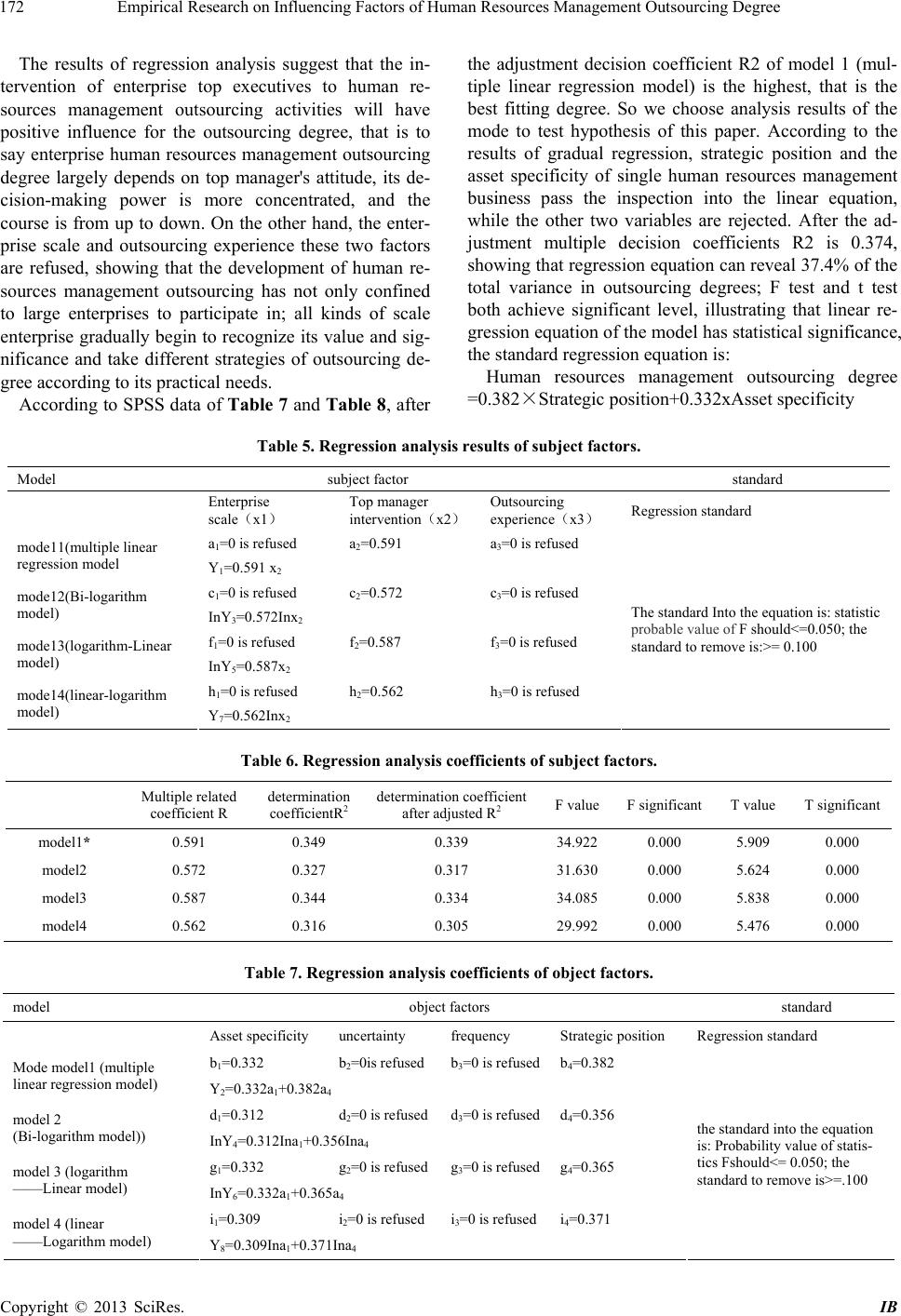 Empirical Research on Influencing Factors of Human Resources Management Outsourcing Degree 172 The results of regression analysis suggest that the in- tervention of enterprise top executives to human re- sources management outsourcing activities will have positive influence for the outsourcing degree, that is to say enterprise human resources management outsourcing degree largely depends on top manager's attitude, its de- cision-making power is more concentrated, and the course is from up to down. On the other hand, the enter- prise scale and outsourcing experience these two factors are refused, showing that the development of human re- sources management outsourcing has not only confined to large enterprises to participate in; all kinds of scale enterprise gradually begin to recognize its value and sig- nificance and take different strategies of outsourcing de- gree according to its practical needs. According to SPSS data of Table 7 and Table 8, after the adjustment decision coefficient R2 of model 1 (mul- tiple linear regression model) is the highest, that is the best fitting degree. So we choose analysis results of the mode to test hypothesis of this paper. According to the results of gradual regression, strategic position and the asset specificity of single human resources management business pass the inspection into the linear equation, while the other two variables are rejected. After the ad- justment multiple decision coefficients R2 is 0.374, showing that regression equation can reveal 37.4% of the total variance in outsourcing degrees; F test and t test both achieve significant level, illustrating that linear re- gression equation of the mode l has statistical sign ificance, the standard regression equation is: Human resources management outsourcing degree =0.382×Strategic position+0.332xAsset specificity Table 5. Regression analysis results of subject factors. Model subject factor standard Enterprise scale(x1) Top manager intervention(x2) Outsourcing experience(x3) Regression standard a1=0 is refused a2=0.591 a3=0 is refused mode11(multiple linear regression model Y1=0.591 x2 c1=0 is refused c2=0.572 c3=0 is refused mode12(Bi-logarithm model) InY3=0.572Inx2 f1=0 is refused f2=0.587 f3=0 is refused mode13(logarithm-Linear model) InY5=0.587x2 h1=0 is refused h2=0.562 h3=0 is refused mode14(linear-logarithm model) Y7=0.562Inx2 The standard Into the equation is: statistic probable value of F should<=0.050; the standard to remove is:>= 0.100 Table 6. Regression analysis coefficients of subject factors. Multiple related coefficient R determination coefficientR2 determination coefficient after adjusted R2 F value F significant T value T significant model1* 0.591 0.349 0.339 34.922 0.000 5.909 0.000 model2 0.572 0.327 0.317 31.630 0.000 5.624 0.000 model3 0.587 0.344 0.334 34.085 0.000 5.838 0.000 model4 0.562 0.316 0.305 29.992 0.000 5.476 0.000 Table 7. Regression analysis coefficients of object factors. model object factors standard Asset specificity uncertainty frequency Strategic position Regression standard b1=0.332 b2=0is refused b3=0 is refusedb4=0.382 Mode model1 (multiple linear regression model) Y2=0.332a1+0.382a4 d1=0.312 d2=0 is refusedd3=0 is refusedd4=0.356 model 2 (Bi-logarithm model)) InY4=0.312Ina1+0.356Ina4 g1=0.332 g2=0 is refusedg3=0 is refusedg4=0.365 model 3 (loga rithm ——Linear model) InY6=0.332a1+0.365a4 i1=0.309 i2=0 is refused i3=0 is refusedi4=0.371 model 4 (lin e a r ——Logarithm model) Y8=0.309Ina1+0.371Ina4 the standard into the equation is: Probability value of statis- tics Fshould<= 0.050; the standard to remove is>=.100 Copyright © 2013 SciRes. IB 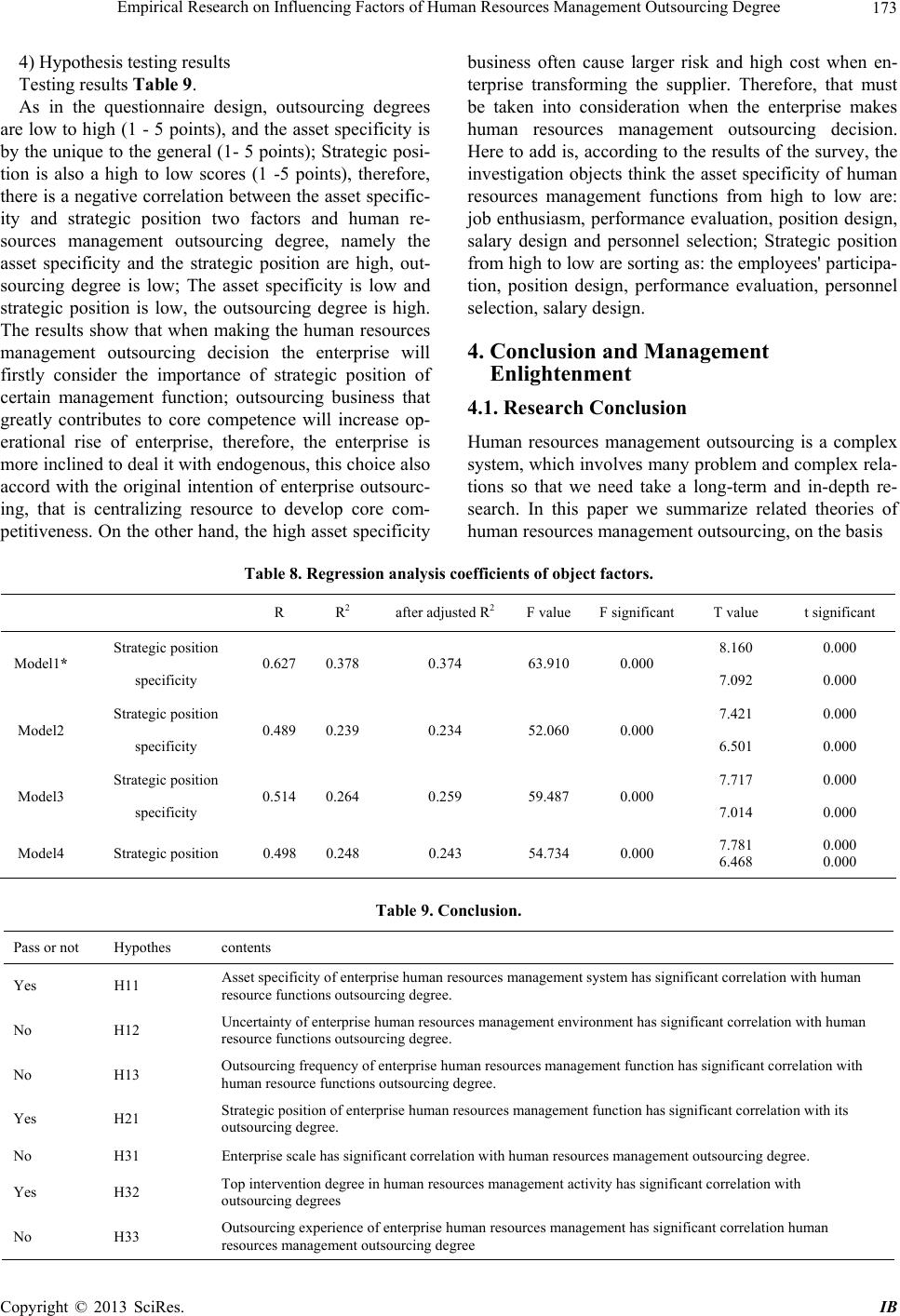 Empirical Research on Influencing Factors of Human Resources Management Outsourcing Degree 173 4) Hypothesis testing results Testing results Table 9. As in the questionnaire design, outsourcing degrees are low to high (1 - 5 points), and the asset specificity is by the unique to the general (1- 5 points); Strategic posi- tion is also a high to low scores (1 -5 points), therefore, there is a negative correlation between the asset specific- ity and strategic position two factors and human re- sources management outsourcing degree, namely the asset specificity and the strategic position are high, out- sourcing degree is low; The asset specificity is low and strategic position is low, the outsourcing degree is high. The results show that when making the human resources management outsourcing decision the enterprise will firstly consider the importance of strategic position of certain management function; outsourcing business that greatly contributes to core competence will increase op- erational rise of enterprise, therefore, the enterprise is more inclined to deal it with endogenous, th is choice also accord with the original intention of enterprise outsourc- ing, that is centralizing resource to develop core com- petitiveness. On the other hand, the high asset specificity business often cause larger risk and high cost when en- terprise transforming the supplier. Therefore, that must be taken into consideration when the enterprise makes human resources management outsourcing decision. Here to add is, according to the results of the survey, the investigation objects think the asset specificity of human resources management functions from high to low are: job enthusiasm, performance evaluation, position design, salary design and personnel selection; Strategic position from high to low are sorting as: the employees' participa- tion, position design, performance evaluation, personnel selection, salary design. 4. Conclusion and Management Enlightenment 4.1. Research Conclusion Human resources management outsourcing is a complex system, which involves many problem and co mplex rela- tions so that we need take a long-term and in-depth re- search. In this paper we summarize related theories of human resources management outsourcing, on the basis Table 8. Regression analysis coefficients of object factors. R R2 after adjusted R2 F value F significantT value t significant Strategic position 8.160 0.000 Model1* specificity 0.627 0.378 0.374 63.910 0.000 7.092 0.000 Strategic position 7.421 0.000 Model2 specificity 0.489 0.239 0.234 52.060 0.000 6.501 0.000 Strategic position 7.717 0.000 Model3 specificity 0.514 0.264 0.259 59.487 0.000 7.014 0.000 Model4 Strateg ic po s it i on 0.498 0.248 0.243 54.734 0.000 7.781 6.468 0.000 0.000 Table 9. Conclusion. Pass or not Hypothes contents Yes H11 Asset sp ecificity of enterprise human resources management system has significant correlation with human resource functions outsourcing degree. No H12 Uncertainty of enterprise human resources ma nagement environment has significant correl a t i on w i t h h uman resource functions outsourcing degree. No H13 Outsourcing frequency of enterprise human resources management function has significant correlation with human resource functions outsourcing degree. Yes H21 Strategic position of enterpr i se human resources mana geme nt fu nction h as significant correlation with its outsourcing degree. No H31 Enterprise scale has significant correlation with human resources management outsourcing degree. Yes H32 Top in tervention degree in human resources managem ent activity has significant correlation with outsourcing degrees No H33 Outsourcing experience of enterprise human resources management has significant correlation h uman resources management outsourcing degree Copyright © 2013 SciRes. IB  Empirical Research on Influencing Factors of Human Resources Management Outsourcing Degree 174 of which we establish a research model of enterprise hu- man resources management outsourcing degree and in- fluencing factors, and prove them through the empirical method; after an econometric analysis, two of subject influencing factors of human resources management outsourcing are refused, and only "top intervention" passes the verification; and two of object factors are re- fused; "strategic position" and "asset specificity “of the human resources management function respectively pass the inspection. 4.2. Management Enlightenment First, the intervention of top manager to human resources management outsourcing activities will have positive influence to outsourcing degree, that is to say enterprise human resources management outsourcing degree de- pends largely on top manager's attitude, its decision- making power is more concentrated, and the course is from up to down. Second, enterprise scale and the past outsourcing ex- perience of enterprise have little influence on human resources management outsourcing decision. A ll kinds of scale enterprise gradually begin to recognize the value and significance, and take different degree of outsourcing strategies according its practical needs. Third, outsourcing is to pass the non-core business to enterprise external experts to operate; it can save the re- sources on non-core business to concentrate on the de- velopment of the core competitiveness, that viewpoint has been confirmed again in this study. In the field of human resource management outsourcing is also effec- tive, enterprise is more inclined to outsource those low core strength or low strategic position business out. Fourth, in the three characteristics of trade, the influ- ence of asset specificity on human resources manage- ment outsourcing degree is obvious, because human re- sources management changes at a slower speed relative to the change of outsourcing areas of information tech- nology management and other areas, and it has close contact with the enterprise culture, and enterprise tradi- tion. Therefore, for that human resources management business whose asset specificity is higher and has more enterprise characteristics, if it is outsourced, suppliers may not be able to fully understand the rules and culture in a short time, so outsourcing risk is higher. Fifth, from the definition of the variables in this re- search, we can find that there is duplication in concept of peculiarity in the three characteristics of asset specificity and measure of business strategic position of an out- sourcing deal, and our empirical test proves that the asset specificity also presents the features except business strategic position and the human resources management outsourcin g de gree have negat i ve correla ti o n. REFERENCES [1] J. Chen, Core Competence of Corporation: A Literature Review, Science Research Management, Vol. 20, 2009, pp. 20-25. [2] Q. W. Huang, “Construction of the Enterprise Core Com- petence and Value Promotion,” The Journal of Quantita- tive & Technical Economics, Vol. 4, 2008. [3] J. Q. Sun, “Research of Outsourcing Level and Influence Factors, Liaoning Economy, Vol. 4, 2006, pp. 38-49. [4] M. L. Wu, SPSS Statistics Application, Beijing: China Railway Publishing Press, 2009. Copyright © 2013 SciRes. IB |

